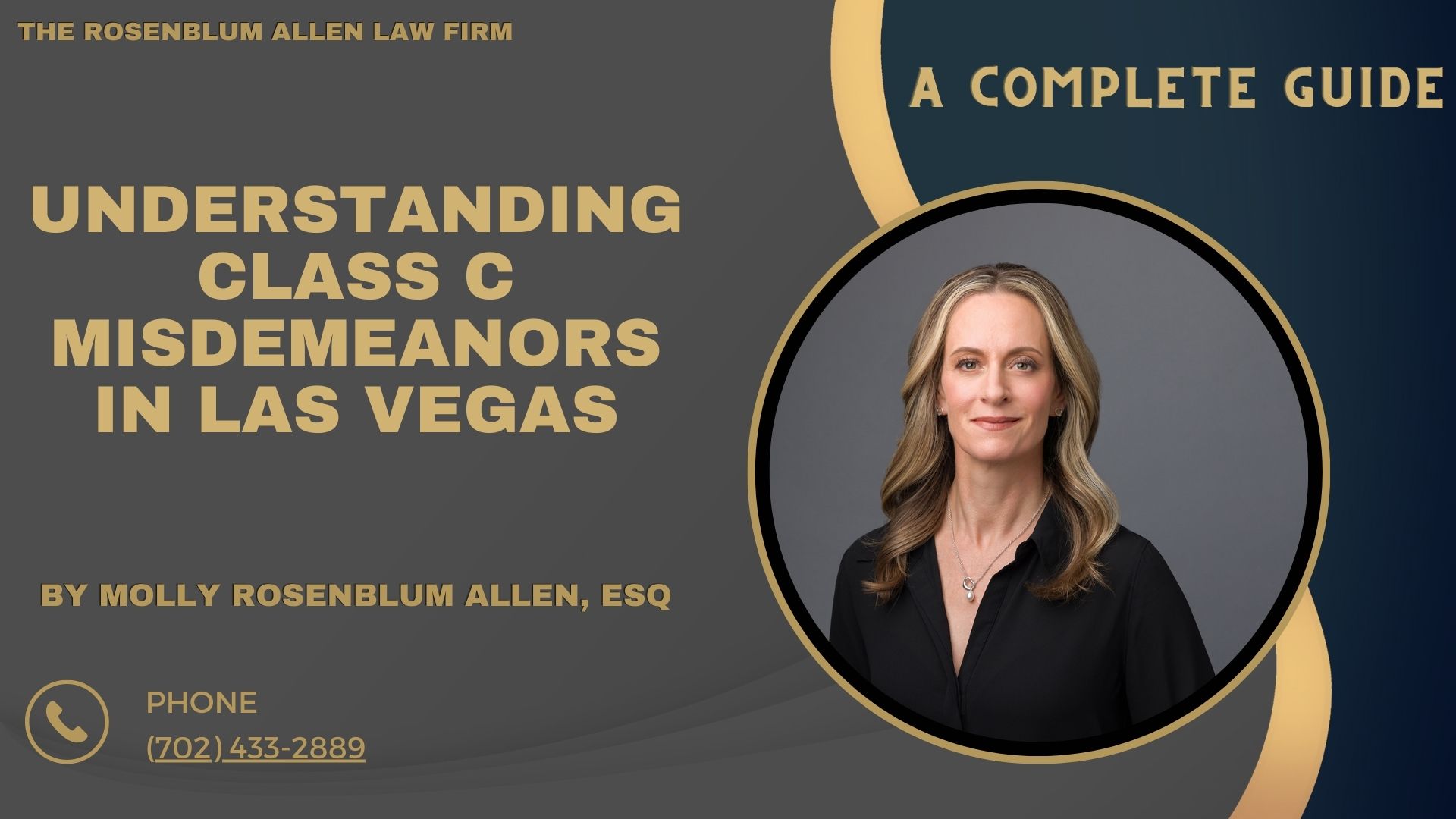When it comes to navigating the complexities of the legal system, understanding the nuances of various charges can be daunting. In Las Vegas, misdemeanors are not just a minor inconvenience; they can have significant implications on your life. This guide aims to demystify one specific category: the Class C misdemeanor. Whether you’re a resident or a visitor who’s found themselves on the wrong side of the law, knowing what you’re up against is the first step towards resolution.

 What is a Class C Misdemeanor in Las Vegas?
What is a Class C Misdemeanor in Las Vegas?
Definition and Legal Standing
In the grand scheme of legal infractions, misdemeanors are considered less severe than felonies but more serious than petty offenses or infractions. Las Vegas, like many jurisdictions, categorizes misdemeanors to reflect the severity of the crime. A Class C misdemeanor represents the least severe category but still carries consequences that can impact your life.
Comparison with Other Misdemeanor Classes
To put it in perspective, misdemeanors in Las Vegas are often classified into three categories: A, B, and C. Class A misdemeanors are the most serious, with penalties that can include up to 6 months in jail. Class B misdemeanors come next, with Class C misdemeanors being the least severe. Understanding where your charge falls can help gauge the potential penalties you might face.
Examples of Class C Misdemeanors
Class C misdemeanors can encompass a variety of offenses, each with its own set of legal implications. Some common examples include:
- Traffic Violations: Minor speeding over the limit or failing to stop at a stop sign.
- Petty Theft: Shoplifting items of relatively low value.
- Disorderly Conduct: Actions that disturb the peace or infringe upon the comfort of others in public spaces.
Legal Consequences of a Class C Misdemeanor
Potential Penalties
The penalties for a Class C misdemeanor in Las Vegas are designed to be punitive but not excessively harsh. They can include:
- Fines: Often not exceeding a few hundred dollars.
- Community Service: Mandatory participation in community improvement activities.
- Jail Time: Rare for Class C misdemeanors, but possible in cases with aggravating factors.
Long-term Impacts
The implications of a Class C misdemeanor can extend beyond immediate penalties:
- Criminal Record Implications: A conviction may appear on background checks.
- Employment and Housing Consequences: Potential difficulties in securing jobs or housing due to the misdemeanor record.

Navigating the Legal System for Class C Misdemeanors in Las Vegas
Arrest and Booking Process
Understanding what to expect if you’re arrested for a Class C misdemeanor can help reduce stress and prepare you for the steps ahead.
What to Expect During Arrest
If you’re arrested, you’ll likely be taken into custody for booking. This process includes taking your personal information, fingerprinting, and possibly holding you until a court appearance can be scheduled.
Booking and Initial Court Procedures
After booking, you’ll be given information on your court date. It’s crucial to take note of this date and prepare accordingly, ideally with the assistance of legal counsel.
Rights of the Accused
Knowing your rights is fundamental in any legal proceeding.
Legal Representation
You have the right to an attorney. If you cannot afford one, the court may appoint a public defender to your case.
Right to a Fair Trial
Every defendant is entitled to a fair trial. This includes the right to present evidence, cross-examine witnesses, and more.
Steps to Take Following a Charge
Seeking Legal Counsel
Finding an experienced defense attorney who understands the nuances of Las Vegas’s legal system is crucial. They can provide guidance, represent you in court, and work towards the best possible outcome.
Preparing for Court
Gather any evidence that may support your case, including witness statements, photographs, or documents. Your attorney will help you organize this information and prepare for your court appearance.

Defense Strategies for Class C Misdemeanors
Navigating the legal waters of a Class C misdemeanor in Las Vegas requires a smart and tailored strategy for your specific situation. Let’s break down the common defense tactics and the pivotal role of a defense attorney in your corner.
Common Defense Tactics
When defending against a Class C misdemeanor, the approach can vary widely depending on the nature of the charge. However, some strategies stand out for their effectiveness:
Challenging Evidence: This involves questioning the accuracy or legality of the evidence presented by the prosecution. Was the evidence obtained lawfully? Is it reliable?
Negotiating Plea Deals: Sometimes, the best outcome is achieved outside of court. Plea negotiations can lead to reduced charges or alternative penalties, such as community service instead of fines.
Each case is unique. A seasoned defense attorney can help identify the most promising strategy for your circumstances.
Importance of a Defense Attorney
Having a defense attorney is not just an option; it’s your ticket to a fair fight in court. Here’s why their role is crucial:
Expertise in Local Laws: They have in-depth knowledge of Nevada’s legal system and can navigate its complexities with ease.
Representation in Court: They speak the language of the courtroom, advocating on your behalf and making sure your voice is heard.

The Role of a Defense Attorney in Class C Misdemeanor Cases
Evaluating Your Case
Initial Consultation
The journey often starts with a consultation. Your attorney will listen to your story, assess the facts, and lay out your options. This step is vital for building a solid foundation for your defense.
Strategic Planning
Your attorney will devise a strategy tailored to your situation after understanding the ins and outs of your case. This plan will guide the defense efforts, from evidence collection to courtroom presentation.
Building a Defense
Gathering Evidence
Your attorney will undertake a thorough investigation to gather all relevant evidence. This might include security footage, witness statements, or documentation. This evidence supports your innocence or mitigates your liability.
Witness Interviews
Witnesses can play a pivotal role in your defense. Your attorney will identify and interview potential witnesses. This will build a solid support base for your case.
Court Representation
Pleading Your Case
In court, your attorney will present your defense. They will argue against the prosecution’s claims. They will work to highlight any doubts regarding your guilt.
Negotiating with Prosecutors
Your attorney may also engage in negotiations with the prosecutor behind the scenes. They seek to reduce your charges or secure a more favorable outcome.

Expungement and Sealing of Class C Misdemeanor Records
A Class C misdemeanor doesn’t have to be a lifelong burden. Nevada offers paths to clear your record through expungement or sealing. This gives you a fresh start.
Eligibility Criteria
Time Since Conviction
Typically, you must wait after completing your sentence to apply for expungement. During this period, the court can see if you’ve kept a clean record after the conviction.
Completion of Sentence
To consider your record for expungement, you must fully comply with your sentence. This includes paying all fines and completing any mandated programs.
Process and Procedures
Filing for Expungement
This involves submitting a formal petition to the court. In the petition, you outline your request to have your criminal record expunged or sealed.
Court Hearings
Sometimes, they schedule a hearing. It allows both you and the prosecution to present arguments. It is about your petition for expungement.
Benefits of Expungement
Clearing Your Record: Successful expungement or sealing effectively erases or conceals your misdemeanor from public view.
Restoring Rights: This process can restore rights or opportunities that were affected by your criminal record, such as employment prospects.

Breaking It All Down
Facing a Class C misdemeanor in Las Vegas can feel overwhelming, but it’s important to remember that you’re not without options and support.
From understanding the nature of your charge to navigating the legal system and potentially clearing your record, each step offers a chance to move forward.
The key is to approach the situation with knowledge, preparation, and the proper legal assistance.
The journey through the legal process, from arrest to possible expungement, is a testament to the importance of informed decision-making and advocacy.
While the road may seem daunting, remember that each step taken is a move toward resolution and, ultimately, a fresh start.

More Frequently Asked Questions
Can I handle a Class C misdemeanor case in Las Vegas without hiring a lawyer?
Yes, you have the right to represent yourself in court for a Class C misdemeanor. However, the legal system can be complex. Hiring an experienced defense attorney is advisable. They can provide valuable guidance and improve your chances of a favorable outcome.
How long does a Class C misdemeanor stay on my record in Las Vegas?
A Class C misdemeanor can remain on your record indefinitely unless you take steps to have it sealed or expunged. Your eligibility for expungement depends on various factors, including the nature of the crime and your subsequent legal history.
Will a Class C misdemeanor affect my ability to travel?
While a Class C misdemeanor is unlikely to impact domestic travel within the United States, it may pose challenges when applying for international visas. Some countries may deny entry to individuals with a criminal record.
Can a Class C misdemeanor affect my professional license?
Yes, depending on your profession and the regulations of the licensing board, a Class C misdemeanor could impact your professional license. Consulting with a legal professional is advisable to understand the potential consequences for your specific situation.
Is community service a common penalty for Class C misdemeanors in Las Vegas?
Yes, community service is a possible penalty for Class C misdemeanors. The court may impose it instead of fines or jail time, depending on the offense and the court’s discretion.
What should I do if I miss my court date for a Class C misdemeanor charge?
If you miss your court date, the court may issue a bench warrant for your arrest. It’s crucial to contact the court as soon as possible, explain your absence, and seek to reschedule your appearance. Consulting with an attorney can also help manage the situation effectively.
Can I get a Class C misdemeanor charge reduced?
Yes, it’s possible to get a Class C misdemeanor charge reduced, especially with the assistance of an experienced defense attorney. Reductions may occur through plea bargaining or by demonstrating weaknesses in the prosecution’s case.
What’s the difference between expunging and sealing a record in Las Vegas?
Expunging a record essentially erases it, as if the offense never occurred. Sealing a record hides it from public view but may still be accessible under certain conditions, such as by court order.
How can I find out if I’m eligible for expungement of a Class C misdemeanor in Las Vegas?
Eligibility for expungement varies based on factors like the nature of the offense and your criminal history. Consulting with a Nevada attorney who specializes in criminal law is the best way to determine your eligibility.
Are there alternatives to court for resolving a Class C misdemeanor in Las Vegas?
Yes, alternatives may include negotiation for a plea deal or participation in diversion programs, if available. These alternatives could lead to reduced charges or penalties, and consulting with legal counsel is advisable to explore them thoroughly.

Glossary
Arrest: The act of being taken into police custody due to suspicion of having committed a crime. An arrest marks the beginning of the formal legal process against an individual.
Booking: The administrative process that follows an arrest, where the details of the accused are recorded, and they are officially entered into the police system.
Class C Misdemeanor: A category of offenses in Las Vegas that are considered less severe than felonies and Class A and B misdemeanors. They typically involve minor crimes and carry lighter penalties.
Criminal Record: A record maintained by law enforcement agencies detailing an individual’s criminal history, including arrests, charges, and convictions.
Defense Attorney: A lawyer specializing in the defense of individuals and companies charged with criminal activity. They provide representation and advice throughout the legal process.
Expungement: The legal process by which a criminal record is destroyed or sealed from a state or federal record. It effectively removes the record of a person’s arrest, charge, or conviction.
Fines: Monetary penalties imposed by a court as punishment for a crime. Fines for misdemeanors are typically less than those for felonies.
Jail Time: A period of incarceration in a local jail as punishment for a crime. Jail time for misdemeanors is generally shorter than for felonies.
Misdemeanor: A type of criminal offense that is less serious than a felony but more serious than an infraction. Misdemeanors are often punishable by fines, community service, probation, or short-term imprisonment.
Plea Deal (Plea Bargaining): An agreement in a criminal case between the prosecutor and defendant wherein the defendant agrees to plead guilty to a lesser charge or only one of several charges in exchange for some concession from the prosecutor.
Prosecutor: A legal representative of the prosecution in countries with either the common law adversarial system or the civil law inquisitorial system. The prosecution is the legal party responsible for presenting the case against an individual accused of breaking the law.
Public Defender: A lawyer appointed by the court to represent defendants who cannot afford to hire an attorney. The public pays public defenders and is available in criminal cases where the accused faces the possibility of incarceration.
Sealing: The process of concealing records of a criminal conviction from public view. Unlike expungement, sealed records are not destroyed and may still be accessed under certain legal conditions.
Witness: A person who saw something happen or has knowledge of something relevant to a criminal case. Witnesses can provide valuable testimony in court to help establish the facts of the case.

Additional Resources for You
In addition to this comprehensive guide on navigating Class C misdemeanors in Las Vegas, our lead attorney, Molly Rosenblum, Esq., has created a suite of other resources to assist you in your time of need. These resources cover a wide range of legal topics, offering in-depth insights and guidance on various aspects of criminal law. Whether you’re seeking more information on specific legal concepts or need advice on handling your legal situation, these resources can provide valuable support:
Double Jeopardy: Understand the principle that prevents an individual from being tried twice for the same crime, a fundamental protection in the American legal system.
Hung Jury: Learn what happens when a jury cannot reach a unanimous decision, leading to a mistrial and the potential implications for a defendant.
Circumstantial Evidence: Explore how evidence that relies on an inference to connect it to a conclusion of fact can play a crucial role in criminal cases.
Indicted Vs Charged: Discover the difference between being indicted and being charged, and the legal processes involved in each.
Difference Between Jail And Prison: Clarify the distinctions between jail and prison in terms of the duration of stay, the types of offenses associated with each, and the administration.
What Are Miranda Rights: Understand the critical rights that are read to individuals upon arrest, including the right to remain silent and the right to an attorney.
How To Check If You Have An Outstanding Warrant: Find out the steps you can take to check for any outstanding warrants against you, helping you address legal issues proactively.
What To Look For In A Criminal Defense Lawyer: Gain insights into what qualities and qualifications you should seek in a criminal defense lawyer to ensure the best representation.
Possible Ways To Reduce A Felony Charge: Explore strategies that may be employed to reduce a felony charge, potentially lessening the severity of the penalties involved.
Should You Accept A Plea Bargain: Consider the pros and cons of accepting a plea bargain, and how it can affect the outcome of your case.
Molly Rosenblum, Esq., and the team at The Rosenblum Allen Law Firm are committed to providing resources that empower you with knowledge and assist you in navigating the complexities of the legal system. Whether you’re facing a Class C misdemeanor or another legal challenge, these resources are designed to help you understand your rights and options.

Outside Resources for You
To further support your understanding and navigation of legal issues related to Class C misdemeanors in Las Vegas and other related legal matters, here are several offsite resources that may prove invaluable. These resources offer a wealth of information on legal rights, procedures, and advice:
American Bar Association (ABA): A premier resource for legal professionals and the public, providing information on various areas of law, legal career advice, and public services.
National Association of Criminal Defense Lawyers (NACDL): An organization focused on ensuring justice and due process for persons accused of crime or misconduct. A great resource for finding defense counsel and understanding criminal defense strategies.
FindLaw: Offers a comprehensive range of information on legal topics, including criminal law, family law, employment law, and more, making it a valuable resource for general legal questions and finding attorneys.
Justia: Provides free access to a wide array of legal resources, including case law, codes, legal articles, and an extensive directory of lawyers across different practice areas.
Avvo: Features a Q&A forum where users can ask legal questions and receive answers from lawyers. Also offers lawyer reviews and ratings, helping individuals to find and select the right lawyer for their needs.
National Legal Aid & Defender Association (NLADA): Dedicated to providing legal representation to those who cannot afford it, this site is a good starting point for finding legal aid and public defense resources.
The Innocence Project: Focuses on exonerating wrongly convicted individuals through DNA testing and reforms the criminal justice system to prevent future injustice. It’s an excellent resource for understanding issues related to wrongful convictions and criminal justice reform.
Each of these resources offers a unique perspective and depth of knowledge that can help individuals facing legal challenges, seeking legal advice, or simply looking to educate themselves on the legal system.

A Special Message from Our Lead Attorney, Molly Rosenblum Allen, Esq

Dear Reader,
Thank you for taking the time to explore the resources we’ve provided. I hope you found the information insightful. I hope it empowers you as you navigate your legal concerns. At The Rosenblum Allen Law Firm, we understand the complexities of the legal system. We also understand the stress it can bring into your life. That’s why we’re committed to offering guidance, support, and effective representation. We want to protect your rights and interests.
If you have questions about your specific situation or would like to discuss your case in more detail, I warmly invite you to schedule a free consultation with us. Please call us at (702) 433-2889 to arrange a time that works for you. This consultation is an opportunity for us to understand your needs better. We will offer tailored advice on how best to proceed.
Thank you again for your trust in our resources. We look forward to the opportunity to serve you.
Warm regards,
Molly Rosenblum Allen, Esq.



